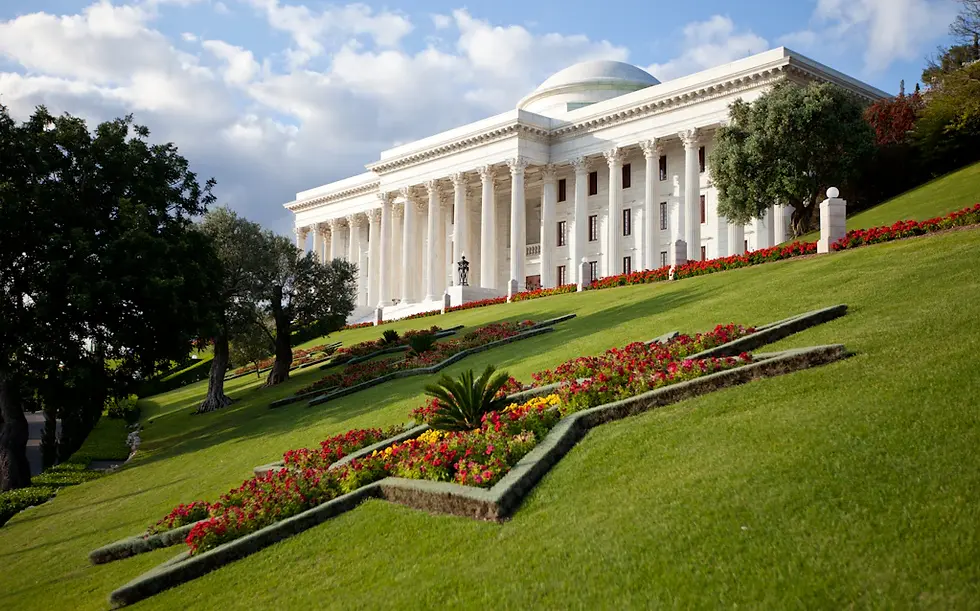top of page

Bahá'u'llàh's Covenant
BAHÁ’U’LLÁH
"O ye that dwell on earth! The religion of God is for love and unity; make it not the cause of enmity or dissension..."
In His writings, Bahá’u’lláh made clear provision for the Bahá’í community to ensure continuing guidance after His passing. This successorship started with ‘Abdu’l-Bahá, the son of Bahá’u’lláh, and then passed to Shoghi Effendi, the grandson of ‘Abdu’l-Bahá. Finally, the successorship concluded with the Universal House of Justice, as decreed by Bahá’u’lláh.
This continuing flow of guidance is referred to as the Covenant of Bahá’u’lláh. Bahá’ís accept the divine authority of the Báb and Bahá’u’lláh, as well as the appointed successors.

'Abdu'l-Bahá
(1844-1921)
`Abdu'l-Baha, the son of Bahá'u'lláh, is considered to be the perfect exemplar of the Bahá'í teachings. In all of their endeavours, Bahá'í’s consciously strive to emulate `Abdu’l-Bahá’s qualities.
In His Will and Testament, Bahá'u'lláh named `Abdu’l-Bahá as His successor and the authorised interpreter of His Writings.
From a young age, `Abdu’l-Bahá witnessed His Father’s persecution and suffering, and spent most of His own life as a prisoner and in exile. `Abdu’l-Bahá was Bahá'u'lláh’s most devoted companion during the long years of suffering. Following Bahá'u'lláh’s passing in 1892, the growing Bahá'í community turned to `Abdu’l-Bahá for guidance and the interpretation of Bahá'u'lláh’s teachings.
Abdu’l-Bahá devoted His life to furthering Bahá'u'lláh’s message of peace and unity in both the East and the West. His unconditional love, generosity and selfless service to humanity offer a vivid demonstration of Bahá'u'lláh’s teachings in action.
At the age of 67, after having spent 40 years as a prisoner, `Abdu’l-Bahá embarked on a series of historic journeys across Europe and America. He visited the United Kingdom twice, first in 1911 and again the following year.

Shoghi Effendi
(1897-1957)
Shoghi Effendi, the Guardian of the Bahá'í Faith was the eldest grandson of `Abdu’l-Bahá. He was studying in Oxford when `Abdu’l-Bahá passed away in 1921. His grandfather’s will stated that Shoghi Effendi had been appointed as the Guardian of the Bahá'í Faith, a position he held until his passing in 1957.
The Guardian facilitated the emergence of the unique system designed by Bahá'u'lláh for administering the affairs of an increasingly diverse, worldwide Bahá'í community, and prepared the community for the establishment of an international governing body, the Universal House of Justice.
During the 36 years of his Guardianship, Shoghi Effendi translated the Bahá'í Scriptures into English, authored several books and wrote thousands of letters in response to questions from Bahá'ís around the world. In his writings, he expounded on Bahá'u'lláh’s teachings, gave an awe-inspiring vision of the future, and offered profound spiritual insights regarding the dynamics of social change.
On 4 November 1957, Shoghi Effendi, during a visit to London, suffered severe influenza, and suddenly passed away. His resting place in the New Southgate Cemetery is a place of prayer and reflection for visitors from all over the world.

The Universal House of Justice
The Universal House of Justice, the international governing council ordained by Bahá'u'lláh, today guides the worldwide Bahá'í community. It is a nine-member body, elected every five years by the entire membership of all National Spiritual Assemblies worldwide.
The Universal House of Justice was first elected in April 1963 by members of the 56 National Spiritual Assemblies that had been established to date. The election of the Universal House of Justice was a tremendously significant event. The worldwide Bahá'í community was able to bring into existence the permanent international institution to guide its affairs, promulgate the laws of the Bahá'í Faith and guide the community to participate systematically in building the prosperous global civilization envisioned by Bahá'u'lláh.
As stipulated by Bahá'u'lláh, the Seat of the Universal House of Justice is located in the Holy Land, on Mount Carmel in Israel, in close proximity to the Shrine of the Bab. In His Book of Laws, Bahá’u’lláh instructed the unique institution of the Universal House of Justice to exert a positive influence on the welfare of humankind, promote education, peace and global prosperity, and safeguard human honour and the position of religion.
bottom of page
